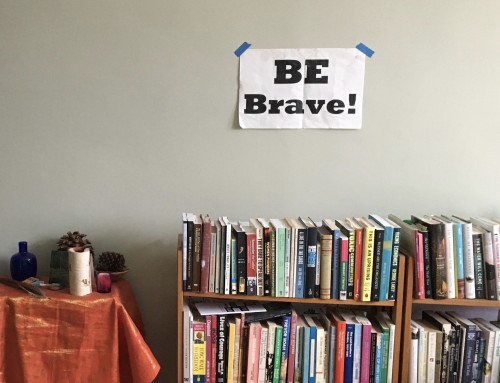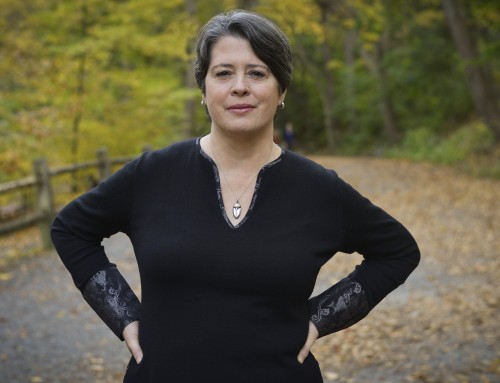After leading a workshop in October, one of the participants sent me Julia Child’s memoir, My Life in France, as a thank you gift, noting that it was partly about Julia “getting in her lane” (a phrase from my book). It was a wonderful surprise, and I’ve been cooking slightly more elaborate meals as I’ve read my way through it. Cooking is not my calling, however, so Julia’s enthusiasm for different kinds of fish almost lost me in the middle of the book, though I’m glad I kept reading. I got to her story of publishing her now classic Mastering the Art of French Cooking just as I was getting discouraged about the publishing business. Hearing her unfailing optimism in the face of rejection and frustration has been very encouraging.
Those of you who saw the movie Julie & Julia (or read my blog post about it) know that Child and her co-authors had a long, hard road to publication. Houghton Mifflin, with whom they had a contract, predicted that the recipes would be too time-intensive for American housewives, and the book would be too expensive to produce without a large market. After being told they would not publish the book she had worked feverishly on for nearly a decade, Julia writes, “I wasn’t feeling sorry for myself. I had gotten the job done, I was proud of it, and now I had a whole batch of foolproof recipes to use. Besides, I had found myself through the arduous writing process. Even if we were never able to publish our book, I had discovered my raison d’etre in life.” Even as she accepted the book might never be published, she persevered. With the help of a friend, she got the book published by Knopf, which is still raking in profits from their investment 48 years later.
I got a kick out of hearing all the terrible titles they considered for the book—like The Witchcraft of French Cooking or French Cooking from the American Supermarket—remembering the numerous emails where my editor and I negotiated the subtitle of my book. I empathized with Julia’s excitement when she got the first bound copy, and found it helpful to read that when she first went on TV, she was so excited to talk about French cooking that she forgot to mention the book. I’m sure that infectious enthusiasm for her topic sold more books than a scripted sales pitch would have.
While her book launch propelled her quickly into the national spotlight (with a NYT review and an appearance on The Today Show right off the bat), my publicity returns have been less splashy. I was feeling a little discouraged last week when some disappointing sales figures were followed by a rejection from a website I was hoping would publish an article I had written. In the midst of that low point, I ran into someone from my meeting who said, “Isn’t it great that you’re living your dream?” Oh, yeah, I thought, I’m living my dream. I really am. Then I remembered Dan Gottlieb’s comment (in Chapter 6) about how people have a picture in their minds of how they think things should be, and that keeps them from appreciating what is. “It’s the picture that’s making me disappointed,” I thought. In reality, everything has gone extremely well. I’ve felt well used. Way has opened numerous times. It’s just that I had a picture of how many books I should have sold by now, and that picture was tripping me up.
As often happens right after I have an attitude adjustment, way opened again this week, first through a nice review on Read the Spirit (a site many of you may enjoy, if you don’t know it already) and an excerpt posted on Guideposts, then through an invitation to speak to another group and one to appear on public radio in Yellow Springs Ohio (where I’ll be speaking a week from tomorrow). Julia’s advice to cooks at the end of the last chapter seems to “speak to my condition” like a message in meeting: “Try new recipes, learn from your mistakes, be fearless, and above all have fun!” I think that woman really had The Wisdom to Know the Difference.




Eileen,
It was wonderful to meet you yesterday, and I can’t wait to begin digging into your book as soon as my current book review assingment is past. You’re an excellent public speaker, very relaxed, and you were on track from beginning to end. It was good to see the chairs fill up–ten a.m. on a Sunday is a challenging time to draw people to a reading, but it was a good turnout. I think your manner helped the audience to relax!
I found this link to a letter/response by Robert Olen Butler that I think speaks to the Quaker notion of the ‘way opening.’ I found it very encouraging.
http://www.narrativemagazine.com/issues/fall-2009/letters-young-writer
All the best for your journey,
Helen
Thanks, Helen. Great meeting you, too. Will have to check out the essay.
Unless you really need the money, even if you touch only a few lives that would be wonderfull!